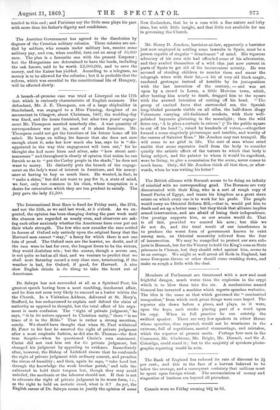Mr. Henry D. Jencken, barrister-at-law, apparently a barrister just now
employed in settling some lawsuits in Spain; must be a person capable of singular " detachment" of mind. His vigorous advocacy of his own side had offended some of his adversaries, and they availed themselves of a wild idea jest now current in parts of Spain to get rid of his inconvenient activity. He was accused of stealing children to murder them and smear the telegraph wires with their fat,—a bit of very old black magic, rendered grotesque instead of horrible by its juxtaposition with the last invention. of the century, — and was set upon by a crowd in Lorca, a little Murcian town, which, after beating him nearly to death, dragged him to the square with the avowed intention of cutting off his head. " The group of excited faces that surrounded me, the Spanish long-bladed poniards visible on all sides, the half-dozen dingy Volunteers carrying old-fashioned muskets, with their well- polished bayonets glistening in the moonlight ; then the wild fierce cry, A la plaza a cortarle la eabeza!' (' To the public square to cut off his head !'), raised by hundreds of voices,—altogether formed a scene singularly picturesque and terrible, and worthy of the canvas of Salvator Rosa." Mr. Jencken may rest tranquil. He will come to no grief in life. The sort of man whose mind amidst that scene separates itself from the body to consider quietly the artistic effect of the torture to which that body is being subject, and the painter to whom it would be expedient, were he living, to give a commission for the scene, never comes to much harm. Only, did Mr. Jencken think all that then, or after- wards, when he was writing his letter?






























 Previous page
Previous page